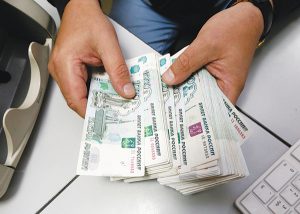As speculation about war with Ukraine fills the news, it’s hardly surprising that the Russian ruble is once again heading to its weakest level against the US dollar — one last seen in 2020 — having depreciated over 5% this month. Ever tougher sanctions from the West have been threatened repeatedly, which would make already-restricted trade and capital movements even more difficult. Both foreign and domestic investors are understandably voting with their feet.
The question is: Will this stop President Vladimir Putin from actually going to war? Moscow has repeatedly denied it plans an attack on its neighbour but, sadly, the fate of the ruble will probably not be a disincentive if he chooses to launch an incursion. The weakness of the currency will hurt but not significantly more than the economy is already
suffering.
Russia is the world’s largest exporter of hydrocarbons, which are largely traded in dollars. If anything, a weaker ruble improves the country’s foreign exchange reserves. The central bank has already suspended its regular daily buying of dollars, which makes little impact. The ruble’s slide ’tis barely a scratch compared to the vagaries the Turkish lira has been put through in recent years to no discernible effect on its leader. The only non-military measures that might work I detailed back in December: cutting off Russia and its related corporate entities from the international debt markets and payment systems. But, so far, the West has stayed its hand, hoping diplomacy will prevail.
Still, a rapidly weakening currency is highly destabilising for the domestic
economy. It is highly inflationary, too, because Russia imports many foreign goods and foodstuffs. Its economy grew 4.3% last year, more than reversing the previous year’s Covid-related drop, but it is expected to moderate this year and next to around 2.5% annualised growth. (And, of course, who knows what happens in case of war.) The country has no substantial economic buffer to fall back upon; and a sudden shock could precipitate recession.
Putin is not going to enjoy seeing the ruble weaken further. The central bank of Russia is expected to hike its target rate from the current 8.5% by a further 50 or even 100 basis points at its next meeting on Februart 11. A weaker currency is only going to make that more urgent as the feed through could easily add another percentage point or more to headline price gains over time. With CPI expected to tick up to 8.7% in January, it means the central bank is left in rate-hiking mode. Producer prices are running near 30% as even a large oil and gas producer like Russia is not immune from the
energy price inflation or Covid-induced logistical bottlenecks.
While the state of the ruble matters somewhat, it is not likely to be sufficient on its own to change the course of world events. The Russian capacity for suffering is legendary. However, Putin will have to calculate a weakened currency into the fallout from a full-scale invasion of Ukraine: global opprobrium, the complete tanking of Russian financial markets and the domestic economy with it. That is, if he is still calculating.
—Bloomberg
Marcus Ashworth is a Bloomberg Opinion columnist covering European markets. He spent three decades in the banking industry, most recently as chief markets strategist at Haitong Securities in London
 The Gulf Time Newspaper One of the finest business newspapers in the UAE brought to you by our professional writers and editors.
The Gulf Time Newspaper One of the finest business newspapers in the UAE brought to you by our professional writers and editors.
